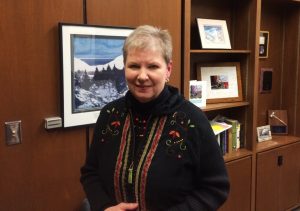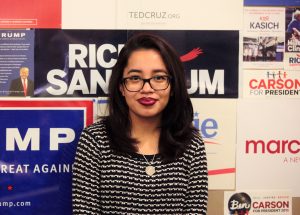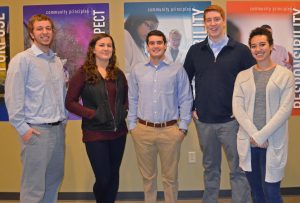This year, the Observer decided to look back on 2015 by addressing national issues that made their way to campus, with an emphasis on those that made an impact on the student body or were taken up by students as an important cause. While we couldn’t cover every issue we wanted, we acknowledge that there are many more conversations to be had (i.e. abortion laws, gender neutral bathrooms, etc.). Here’s a quick glimpse at some of the issues that Augustana tackled this year. Starting with one of the biggest…
Race

Photo by LuAnna Gerdemann.
Racial tensions across higher education have been a topic of conversation throughout much of 2014 and 2015. Augustana has also had protests and demonstrations on these issues. At the end of last year, a group of Augustana students performed a demonstration where they had black students metaphorically chained with duct tape on their mouths while one black student’s voice was drowned out by a circle of white students and other students of color meant to symbolize the oppression of the black community.
The demonstration lead to an influx of conversations about race relations on both a national and local level. The demonstrators also released a set of goals and demands for the college to, in their own words, “make a difference in the way Augustana interacts with Black students and all students of color.” The list of last year’s demands can be found at http://augustanaactivism.tumblr.com.
Last week, many of those same students who participated in last year’s demonstration held a Black Lives Matter petition where they asked students to sign a pledge to support students of color at Augustana. All together, the group of approximately 20 students collected 1,023 signatures and promised to release another list of goals for the college in an effort to further the conversations about race.
Read the group’s statement on their petitioning action below:
“We, the collected but unaffiliated students who organized Wed. Dec. 9 petitioning action, believe our event was a success. We would like to thank the Augustana community for all of their reactions. Positive or negative, we value the contributions of our peers and community.
However, despite being a much different demonstration from last year, we were still accused of being too aggressive and disruptive by the student body. SGA claims to be waiting to help us, but their reactive stance to helping students is not impressive.
We did not elect them for them to sit around and wait for us to come to them. We elected them to be proactive champions of the student body. They have had our last proposal for a year and have, to our knowledge, done nothing visible with it to help address those demands.
In spite of our frustrations, we continue to look forward to how SGA will step up and work with us to make campus less racist. President Sommers has already reached out to this action’s organizing leadership.
We also look forward to a transparent, point by point response to last year’s protest demands from the administration as well, especially in the wake of over 1,000 Augustana community members calling for them to do so and to work harder to keep the campus safe for Black students, students of color and white students alike by being less racist.
In addition, we would like to respond to frustrations we have heard voiced from the administration and SGA about our failure to try to approach them for permission or to solve things on a more personal level before petitioning.
We did give notice to both the administration and SGA in our protest demands from one year ago that we wanted action before the beginning of the next academic year.
I quote from that document, published online since the time of our protest approximately one year ago, that ‘Improvements and advancements must occur by the beginning of the next academic school year (August 2015), and in the event that no improvement has been made, the college will be transparent in sharing with the student body the progress that has been made in addressing these concerns.’
It is now Dec. 2015, and the extra months given to SGA to help us accomplish these goals and administration to take action or be transparent of their own account as we requested, have proved fruitless to our knowledge. This is what led to the petitioning of support from the Augustana community.
As was noted last year by our peers, our posted demands were not flawless. That’s why we will update and republish our demands to reflect the desires and goals of the incoming class of first years as well as the critiques and criticisms of our peers who witnessed our actions last year.
We will be continuing to strive for the goal of basic human dignity that yes, all lives are truly entitled to, but that Black people especially have been denied brutally, cruelly, subtly, overtly and constantly, even since the end of the slavery and the civil rights movement of the 1960s.
In talks with student activists last year, Dean Campbell expressed concern about what would happen should every minority group of students approached the administration with a list of concerns and demanded that action be taken.
As we expressed then, and are continuing to express now, we would like the administration to do something about it.”
Sexual Assault on Campus

Photo by Ryan Silvola.
Jessica Nodulman, public health professor, and Evelyn Campbell, dean of students, are two faculty members who have made the conversation surrounding sexual assault a priority for students.
Last spring, Nodulman lead a student public health campaign class that took the name of Project SAVE, a campaign to address sexual assault. In the end, the class created proposals to revamp the incident report emails, for a bystander intervention campaign, for a new bathroom poster and proposals for posters addressing issues regarding consent and sexual assault.
The most notable changes to arise out of Project SAVE have been magnets placed in all the Transitional Living Areas that said “Party the Right Way,” addressing the definition of consent, the college using Project SAVE’s proposed bathroom posters in their new design and the creation of the new campus organization, Project SAVE.
Another new edition to the campus this year was Campbell’s mandatory Not Anymore online class. The class teaches students about issues relating to the topic of sexual assault, consent, Title IX, stalking, abuse and consumption. Every student on campus had to complete the survey, with upperclassmen’s deadline Oct. 31 and the first-year’s deadline approaching. This class is a way to make sure the campus has a foundation of education relating to sexual assault.
Abortion: Pro-life v. Pro-choice
Nationally, the topic of Congress voting to defund Planned Parenthood has been one that gripped many headlines. Locally, Augustana’s group Right to Life is one that has brought the topic of abortions to the forefront of conversations in the past year. In April, the group hosted their annual Life Week in which the group posted posters condemning abortion and posting white flags to represent “the third of our generation lost to abortion.” As the organization has stated, the intent of such events is to make people uncomfortable in order to bring awareness to this issue.
Earlier this school year, the group was posted on the fourth floor of the Gerber with flyers providing alternatives to abortions. Displays such as these bring up the topic of abortion and open up the conversation to further discussions no matter how students feel about the issue. They also bring up a discussion that students otherwise might not have ever had experienced.
Political Activism

With 2016 political candidates appearing all over the Quad Cities, and the number of visits increasing, 2015 kicked off the party candidate battles. With one of the largest Republican pools, and an extremely small Democratic pool, it proved to be an interesting kickoff. With outsiders like Donald Trump and Ben Carson, a retired neurosurgeon, emerging as opinion leaders, the political sentiments of the public have made it clear: they’re frustrated.
As Pew Research center notes, 74 percent of Americans say they have given a lot or some thought to the 2016 candidates, higher than the shares saying this at comparable points in the past two presidential campaigns. At least 7 in 10 Americans have watched some of the televised debates. With the election still approximately a year away, we can only predict the amount of political discourse that will surface in the coming months.
With the candidates coming so close to campus, it’s only natural that students are becoming more involved in the process. Internships, rallies and networking events have all caught the eye of the Augustana community, and the interest can only grow.
Fiscal Conservatism

Photo by Ryan Jenkins.
Black Friday deals, government spending and the Student Government Association (SGA) all had something in common this year: fiscal conservatism. Reflective of a still recovering economy, cutbacks were made on personal, local and national levels.
With the middle class percentages decreasing, American adults living in middle-income households has fallen from 61 percent in 1971 to 50 percent in 2015, according to Pew Research Center. Retailers, noticing the trend, have turned Black Friday into a weekly event. Sometimes even spontaneous sales in the summer months alluded to being special Black Friday events outside the typical holiday season.
This new approach toward saving, rather than spending, affected not only adults but also college students. More than half of millennials (nearly 52 percent) have less than $1,000 in savings, according to a recent survey from howmuch.net, a personal finance site. The survey was distributed by Google consumer surveys to gather the data. Managing student loan debt and unemployment has become a familiar battle.
Some millenials are taking note, like those in the SGA Senate. With a lower percentage of contingencies being accepted this year and budget cuts earlier in the fall, student groups are taking note of the more stringent financial policies of SGA. With the year winding down, the numbers may show a new era of responsibility on the part of student organization leaders.
Islamaphobia/Terrorism

Photo by LuAnna Gerdemann.
Islam is currently the world’s second-largest religion (after Christianity) and is the fastest-growing major religion, according to Pew Research Center. Yet sentiments, especially in the United States, toward those who practice Islam are becoming exceedingly exclusionary and violent.
The Paris attacks on Nov. 13, have had a negative impact on the opinions of Americans, creating a state of fear similar to the period after the attacks on Sept. 11, 2001.
However, these assumptions are false misconceptions about the Muslim community and its relationship to extremism and terrorism. In fact, most people in multiple countries with significant Muslim populations have an unfavorable view of ISIS and say that suicide bombings and other forms of violence against civilians in the name of Islam are rarely or never justified.
Augustana has taken note. Inviting students to learn more about Islam at the Islamic Center of the Quad Cities, Campus Ministries strove to be inclusive and accepting, helping others learn about something they may have not approached before. On Dec. 15, signatures were collected to support the Muslim community on Augustana’s campus.












































































































